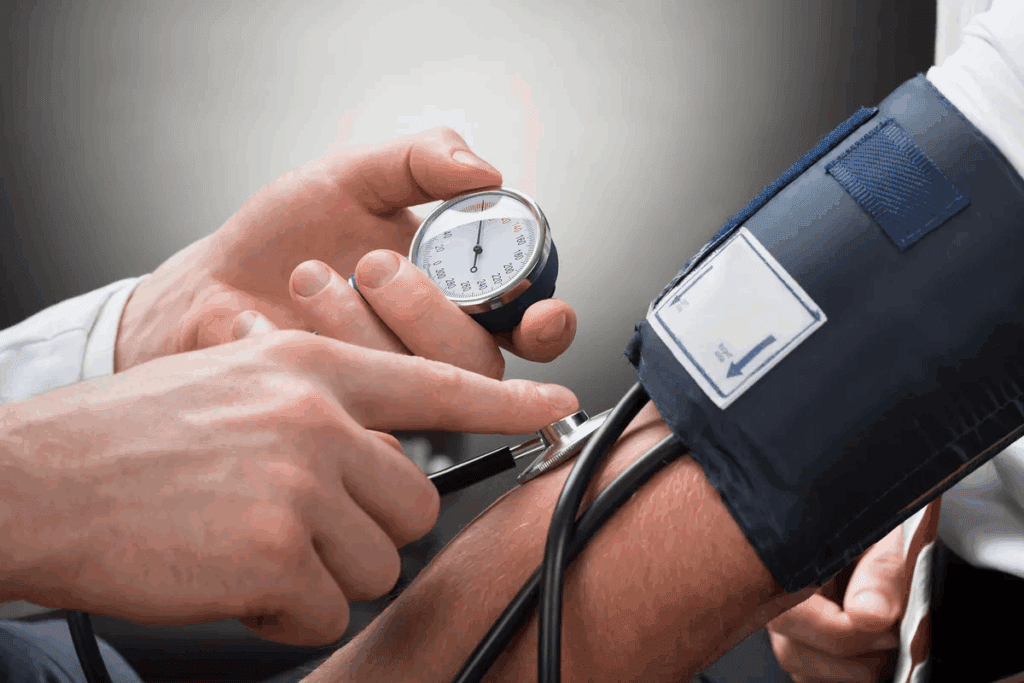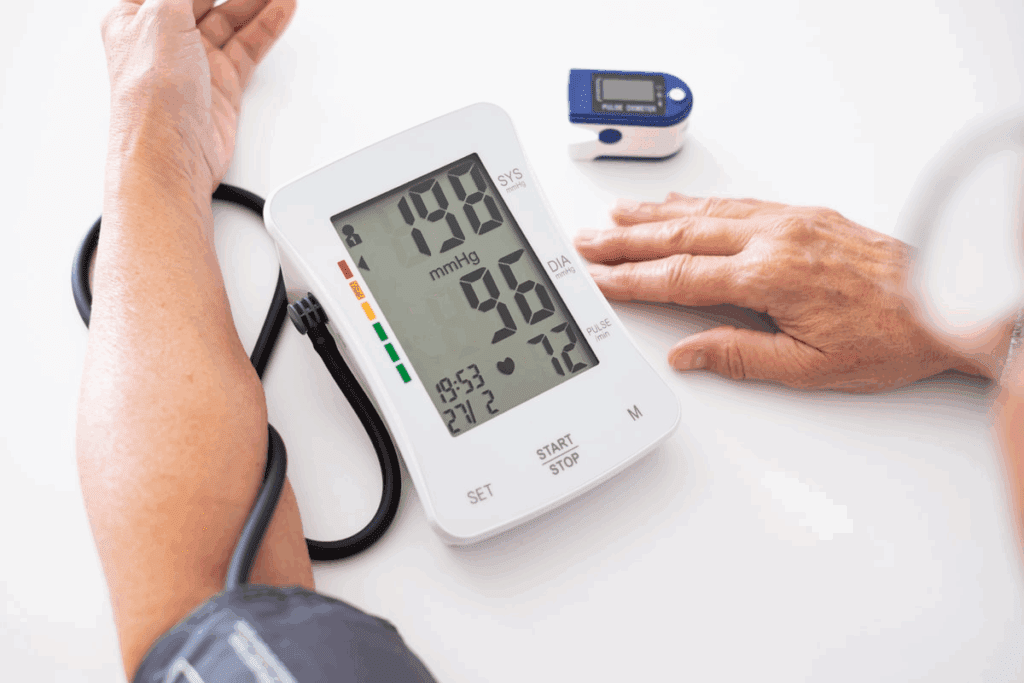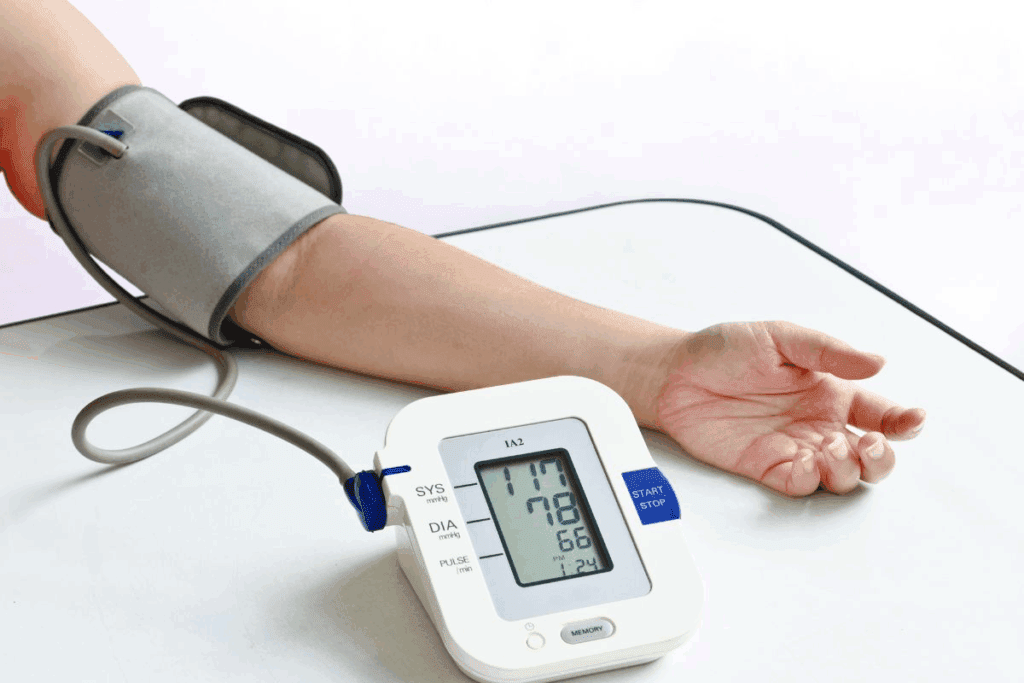
A spike in blood pressure can be scary. But knowing why it happens is key to staying healthy. At Liv Hospital, we focus on top-notch care and put our patients first.
Learn sudden high blood pressure reasons and how to prevent dangerous spikes.
Many things can make your blood pressure jump up fast. Stress, anxiety, and some health issues are big culprits. Medical News Today says these can cause serious symptoms like chest pain and vision problems. This shows why you should get help right away.
We’ll look at the nine main reasons for a rise in blood pressure. This will help you know when to see a doctor. Knowing these reasons can help you prevent and treat high blood pressure early.
Key Takeaways
- Stress and anxiety can trigger a rapid increase in BP.
- Certain medical conditions, such as adrenal gland disorders and thyroid issues, can cause a spike in blood pressure.
- Lifestyle factors, including excessive caffeine intake and smoking, can contribute to high blood pressure.
- Some medications and stimulant drugs can lead to a sudden rise in BP.
- Understanding the causes of sudden high blood pressure is key for prevention and timely medical help.
Understanding Blood Pressure and Sudden Spikes

It’s important to know how blood pressure works to spot sudden spikes. Blood pressure changes due to many things like exercise, emotions, and the time of day. A sudden rise in blood pressure can be a sign of a problem that needs to be looked at.
What Constitutes Normal Blood Pressure
The American Heart Association says normal blood pressure is under 120/80 mmHg. The top number, or systolic pressure, shows the heart’s beat. The bottom number, or diastolic pressure, shows the heart’s rest. Keeping blood pressure in this range is key for heart health.
Defining a Sudden Blood Pressure Spike
A sudden blood pressure spike is a quick and big increase. It can happen for many reasons, like stress or certain medicines. Knowing why and how to handle these spikes is important for staying healthy.
How Blood Pressure Regulation Works
Keeping blood pressure in check is a team effort by the body. The heart, nerves, and kidneys all help. The body adjusts blood pressure as needed, like during exercise or stress. Knowing how this works can help us understand and manage sudden spikes.
The Dangers of Sudden High Blood Pressure

When blood pressure suddenly spikes, it can be very dangerous. This is called a hypertensive crisis. It’s a medical emergency that needs quick help.
Short-term Risks and Complications
A sudden increase in blood pressure can cause serious problems. These include heart attack, stroke, and kidney damage. It can even lead to blindness or organ failure.
This shows how important it is to get medical help right away.
Long-term Health Consequences
If not treated, sudden high blood pressure can harm us for a long time. It can cause chronic heart disease, kidney disease, and vision loss. It also raises the chance of cognitive impairment and dementia later on.
Why Immediate Attention Matters
Getting medical help fast is key when blood pressure spikes suddenly. Quick action can stop serious problems. Knowing the dangers helps us stay healthy and protect our hearts.
9 Sudden High Blood Pressure Reasons Explained
Sudden spikes in blood pressure can be alarming. It’s important to know the causes for proper care. We’ll look at common triggers and risk factors for sudden high blood pressure.
Overview of Common Triggers
Many factors can cause a sudden rise in blood pressure. These include stress and anxiety, certain medications, smoking, and medical conditions like adrenal gland disorders and chronic kidney disease. Knowing these triggers helps manage and prevent sudden blood pressure spikes.
Some common triggers include:
- Stress and anxiety
- Certain medications
- Smoking and nicotine
- Underlying medical conditions
- Dietary factors
- Physical discomfort or pain
- Hormonal changes
- Recreational drugs and stimulants
- Certain medical conditions like pheochromocytoma
Acute vs. Chronic Causes
Causes of sudden high blood pressure can be acute or chronic. Acute causes are immediate, like stress or certain medications. Chronic causes are ongoing, such as kidney disease or adrenal gland disorders.
Risk Factors That Increase Vulnerability
Some risk factors make you more likely to have sudden high blood pressure. These include age, family history, and pre-existing medical conditions. Knowing these risk factors helps in preventing and managing blood pressure.
Some key risk factors to consider are:
- Age and family history
- Pre-existing medical conditions
- Lifestyle factors such as diet and exercise
- Smoking and nicotine use
- Stress and anxiety levels
Understanding the common triggers, causes, and risk factors helps manage blood pressure. It prevents complications and improves health.
Stress and Anxiety: Major Psychological Triggers
Stress or anxiety can make our blood pressure go up suddenly. This happens because our body’s fight-or-flight response kicks in. It’s a natural way our body gets ready to face or run from danger.
The Fight-or-Flight Response Mechanism
The fight-or-flight response is triggered by stress hormones like adrenaline and cortisol. These hormones make our heart beat faster, our blood vessels narrow, and our blood pressure go up. This is meant to be short-term, but long-term stress and anxiety can keep our blood pressure high.
Key factors that trigger the fight-or-flight response include:
- Physical or emotional stress
- Perceived threats or danger
- Anxiety disorders
Anxiety-Induced Hypertension Patterns
Anxiety can cause high blood pressure in different ways. For example:
- Acute anxiety episodes can cause sudden spikes in blood pressure
- Chronic anxiety can lead to long-term high blood pressure
- Bad diet or not exercising can also raise blood pressure
It’s important to understand these patterns to manage anxiety-induced hypertension. By recognizing anxiety signs, we can take steps to lower our blood pressure.
Emotional Outbursts and Blood Pressure
Emotional outbursts, linked to stress and anxiety, can also affect our blood pressure. These outbursts release stress hormones, increasing our heart rate and blood pressure. Using mindfulness, relaxation, and therapy can help control these spikes.
Recognizing stress and anxiety’s role in high blood pressure is the first step to managing it. We can make lifestyle changes, reduce stress, and get help when needed.
Dietary Factors That Cause Sudden BP Spikes
Diet plays a big role in sudden high blood pressure. What we eat affects our heart health. Some foods can cause blood pressure to jump up unexpectedly.
Caffeine Consumption and Blood Pressure
Caffeine is a stimulant that affects blood pressure right away. Drinking too much caffeine can make blood pressure go up because it narrows blood vessels. It’s smart to watch how much caffeine we drink, even more so if we’re sensitive to it.
Research shows caffeine can raise blood pressure in both people with normal and high blood pressure. This effect is usually short-lived. But, drinking it regularly can keep blood pressure high for some.
Tyramine-Rich Foods and Hypertension
Tyramine is in aged, fermented, or spoiled foods. Eating foods high in tyramine can cause sudden blood pressure spikes. This is more likely for people taking certain medications like MAOIs. Foods like aged cheeses, fermented soy, and some wines are high in tyramine.
It’s important for those at risk to know about these foods. Avoiding or cutting down on them can help control blood pressure.
Sodium, Alcohol, and Other Dietary Triggers
Too much sodium can also raise blood pressure. Sodium makes our bodies hold more water, which puts extra pressure on blood vessels. Drinking too much alcohol can also make blood pressure go up, both short and long term.
Other foods like high-fat ones and those with certain additives can also trigger blood pressure issues. Eating a balanced diet and knowing these triggers can help manage blood pressure.
| Dietary Factor | Effect on Blood Pressure | Prevention Strategy |
| Caffeine | Temporary increase due to vasoconstriction | Limit caffeine intake, if sensitive |
| Tyramine-rich foods | Sudden spikes, with MAOIs | Avoid aged, fermented, or spoiled foods |
| High Sodium | Fluid retention, increased blood pressure | Reduce sodium, use salt substitutes |
| Excessive Alcohol | Short and long-term blood pressure elevation | Drink alcohol in moderation |
Medication-Related Blood Pressure Elevation
It’s important to know how some medicines can raise blood pressure. This can lead to health risks. We must watch out for these effects to keep blood pressure in check.
NSAIDs and Their Impact on Blood Pressure
NSAIDs help with pain and swelling. But, they can also raise blood pressure. Long-term use can lead to high blood pressure, which is bad for the heart.
Decongestants and Other Over-the-Counter Medications
Decongestants in cold meds can make blood vessels narrow. This raises blood pressure. Other OTC meds, like some diet pills, can do the same. Always check labels and talk to a doctor if you have high blood pressure.
Prescription Drugs That May Raise BP
Some prescription meds, like antidepressants and steroids, can raise blood pressure. Antidepressants can mess with blood pressure control. Steroids can make you hold more water, raising blood pressure.
Here’s a quick list of meds that might affect blood pressure:
| Medication Type | Potential Effect on Blood Pressure | Precautions |
| NSAIDs | Can cause fluid retention and increase BP | Use with caution; monitor BP regularly |
| Decongestants | Can cause vasoconstriction, increasing BP | Avoid use if you have hypertension |
| Certain Antidepressants | Can affect BP regulation | Discuss risks with your healthcare provider |
| Corticosteroids | Can cause fluid retention, increasing BP | Monitor BP; consider alternative treatments |
Knowing how different medicines can affect blood pressure is key to managing it. Always talk to your doctor before starting or stopping any medicine. This helps keep your blood pressure in a safe range.
Tobacco, Nicotine, and Stimulant Drugs
Tobacco, nicotine, and stimulant drugs can greatly affect blood pressure, causing sudden spikes. These substances lead to immediate blood pressure increases, which is dangerous for heart health.
Immediate Effects of Smoking on Blood Pressure
Smoking tobacco products raises blood pressure. The nicotine in tobacco tightens blood vessels and speeds up the heart. This results in higher blood pressure, possibly leading to hypertension.
“Nicotine’s stimulant effect on the body can lead to a significant increase in blood pressure, even in healthy individuals,” a study on smoking’s heart effects notes.
Recreational Drugs and Stimulants
Recreational drugs and stimulants, including some medications and illegal substances, can also raise blood pressure suddenly. Stimulant drugs increase heart rate and blood pressure by activating the nervous system.
Duration of Blood Pressure Effects
The blood pressure effects of tobacco, nicotine, and stimulant drugs vary in duration. The immediate effects may go away once the substance is out of the body. But, repeated use can cause long-term blood pressure changes.
Knowing the dangers of these substances is key to keeping blood pressure healthy. By avoiding tobacco, nicotine, and stimulant drugs, people can lower their risk of high blood pressure.
Endocrine and Hormonal Causes of Sudden Hypertension
The endocrine system is key in controlling blood pressure. When it doesn’t work right, blood pressure can rise suddenly. Knowing why this happens is important for treating sudden high blood pressure.
Adrenal Gland Disorders and Pheochromocytoma
Problems with the adrenal glands, like pheochromocytoma, can cause sudden high blood pressure. Pheochromocytoma is a rare tumor that makes too much of a hormone. This leads to high blood pressure, fast heart rate, and sweating. Diagnosing pheochromocytoma involves biochemical tests and imaging studies. Treatment usually means removing the tumor surgically.
“The diagnosis of pheochromocytoma is often challenging due to its nonspecific symptoms, but it is vital for effective management,” says Medical Expert, an endocrinologist.
“Early diagnosis and treatment can significantly improve outcomes for patients with pheochromocytoma.”
Thyroid Dysfunction Effects on Blood Pressure
Thyroid problems can also cause sudden high blood pressure. Hyperthyroidism makes the heart beat faster and blood pressure go up. On the other hand, hypothyroidism can mess with blood pressure control, leading to high blood pressure. It’s important to manage thyroid issues to keep blood pressure in check.
Hormonal Fluctuations During Menopause and Pregnancy
Hormonal changes during menopause and pregnancy can affect blood pressure. Menopause brings a drop in estrogen, which can change blood pressure control. Pregnancy-induced hypertension is a big worry, as it can lead to serious problems like preeclampsia. Monitoring blood pressure during pregnancy is key for early detection and management of hypertension.
It’s important to understand the endocrine and hormonal reasons for sudden high blood pressure. By finding and treating the root cause, doctors can help patients manage their blood pressure and lower the risk of serious problems.
Chronic Medical Conditions Behind BP Surges
Some health issues can cause sudden blood pressure increases. We’ll look at how chronic conditions affect blood pressure.
Kidney Disease and Fluid Regulation
Kidney disease can lead to sudden high blood pressure. The kidneys help control fluid and electrolyte levels. When they don’t work right, fluid builds up, raising blood pressure.
Chronic kidney disease (CKD) means the kidneys slowly lose function. As CKD worsens, the risk of high blood pressure grows. It’s key to manage CKD with the right treatment, diet, and lifestyle.
Cardiovascular Conditions and Hypertension
Heart problems like heart failure and coronary artery disease can also raise blood pressure. These issues affect how blood vessels and the heart work, impacting blood pressure.
For example, heart failure makes the heart less efficient, causing fluid buildup and high blood pressure. Coronary artery disease can lead to cardiac ischemia, also raising blood pressure.
Obstructive Sleep Apnea and Nocturnal BP Spikes
Obstructive sleep apnea (OSA) can cause blood pressure spikes at night. OSA means the airway partially or fully blocks during sleep, causing frequent awakenings.
The lack of oxygen from OSA can make blood pressure surge at night. This can lead to a condition called nocturnal hypertension, where blood pressure stays high at night.
| Chronic Medical Condition | Effect on Blood Pressure | Management Strategies |
| Kidney Disease | Fluid retention, electrolyte imbalance | Medication, dietary changes, lifestyle modifications |
| Cardiovascular Conditions | Changes in blood vessel function, cardiac output | Medications, lifestyle changes, surgical interventions |
| Obstructive Sleep Apnea | Nocturnal BP spikes due to intermittent hypoxia | CPAP therapy, lifestyle changes, positional therapy |
Managing these chronic conditions is key to avoiding sudden blood pressure spikes. Knowing the causes and using the right treatments can help prevent high blood pressure and its complications.
Pain, Physical Discomfort, and Blood Pressure
Pain can have immediate and long-term effects on blood pressure. Whether it’s acute or chronic, pain plays a big role in blood pressure levels. We’ll look at how pain impacts blood pressure and how to manage it.
How Acute Pain Triggers BP Elevation
Acute pain, from injury or surgery, triggers a stress response. This leads to higher blood pressure. It’s part of the body’s “fight-or-flight” response to threats.
The body releases stress hormones like adrenaline and cortisol when it’s in pain. These hormones make blood vessels narrow, heart rate go up, and blood pressure rise. Knowing this helps us manage pain and its effect on blood pressure.
Chronic Pain and Hypertension Connection
Chronic pain, which lasts a long time, can cause blood pressure to stay high. The ongoing stress and discomfort can lead to long-term high blood pressure. We’ll look at how chronic pain conditions like arthritis or fibromyalgia affect blood pressure.
Chronic pain not only lowers quality of life but also harms heart health. It’s key to manage chronic pain to avoid blood pressure problems.
Managing Pain to Control Blood Pressure
Managing pain is key to controlling blood pressure. We’ll talk about ways to manage pain, like medication, lifestyle changes, and alternative therapies. By tackling pain, people can lower their risk of high blood pressure or manage it better.
Methods like relaxation, meditation, and physical therapy help manage pain. Healthcare providers might also suggest specific treatments. A full approach to pain management is vital to reduce its impact on blood pressure.
Recognizing a Sudden Blood Pressure Spike
Knowing the signs of a sudden blood pressure spike can save lives. It’s important to recognize warning signs that show a health risk. A sudden rise in blood pressure can show through different symptoms. Spotting these signs early is key to getting medical help fast.
Common Warning Signs and Symptoms
A sudden blood pressure spike can cause several symptoms. These include headache, chest pain, blurred vision, and shortness of breath. Some people might feel dizziness, nausea, or fatigue. Knowing these symptoms helps you act quickly.
It’s vital to check your blood pressure often, if you have high blood pressure or are at risk. Keeping track of your readings can spot patterns and spikes.
Silent Hypertension: The Hidden Danger
Not everyone shows symptoms when their blood pressure goes up. Silent hypertension is when high blood pressure has no clear signs. This is why regular checks are so important to catch hidden dangers.
Silent hypertension is risky because it might not make you go to the doctor until it’s too late. Regular visits and knowing the risks can help manage it well.
When to Seek Emergency Medical Care
It’s important to know when to go to the emergency room. If you have severe chest pain, trouble breathing, or a bad headache with confusion or blurry vision, get help right away. These could be signs of a serious problem.
Being proactive about your health is a good idea. If you’re not sure about your symptoms or have blood pressure concerns, talk to a doctor. Quick action can greatly help with sudden blood pressure spikes.
Conclusion: Prevention and Management Strategies
Preventing and managing sudden high blood pressure requires a mix of lifestyle changes and sometimes medical help. It’s key to manage stress, change your diet, and keep an eye on your blood pressure to avoid sudden spikes.
Making lifestyle changes is vital for prevention. Eating a balanced diet, cutting down on sodium and caffeine, and staying active can help control blood pressure.
Knowing the causes and symptoms of sudden high blood pressure is also important. By understanding what triggers it and taking action, you can lower your risk of sudden spikes.
It’s also important to regularly check your blood pressure. Working with your healthcare provider to create a plan for managing your blood pressure is a good step.
FAQ
What is considered normal blood pressure?
Normal blood pressure is below 120/80 mmHg.
What causes a sudden spike in blood pressure?
Many things can cause a sudden spike in blood pressure. This includes stress, anxiety, certain medicines, and health issues.
Why is stress a major trigger for high blood pressure?
Stress makes the body go into fight-or-flight mode. This releases hormones that tighten blood vessels and increase heart rate. This leads to a sudden rise in blood pressure.
How do dietary factors affect blood pressure?
Eating too much caffeine, tyramine-rich foods, sodium, and alcohol can raise blood pressure. This is because they affect blood vessels and fluid balance.
Can certain medications cause high blood pressure?
Yes, some medicines like NSAIDs, decongestants, and certain prescriptions can raise blood pressure as a side effect.
What is the impact of tobacco and nicotine on blood pressure?
Tobacco and nicotine can have immediate and lasting effects on blood pressure. They constrict blood vessels and stimulate the heart.
How do hormonal changes affect blood pressure?
Hormonal changes, like those in menopause or pregnancy, and endocrine disorders can greatly affect blood pressure.
What role do chronic medical conditions play in blood pressure regulation?
Chronic conditions like kidney disease, heart disease, and sleep apnea can cause sudden blood pressure spikes. They affect fluid balance, vascular health, and breathing.
How does pain affect blood pressure?
Pain, both acute and chronic, can raise blood pressure through the body’s stress response. Managing pain well is key to controlling blood pressure.
What are the warning signs of a sudden blood pressure spike?
Warning signs include headache, dizziness, nausea, and shortness of breath. Some people may have silent hypertension with no symptoms.
When should I seek medical attention for high blood pressure?
Seek immediate medical help for severe symptoms or extremely high blood pressure. Quick action can prevent serious problems.
How can I prevent and manage sudden high blood pressure?
Prevent and manage sudden high blood pressure by making lifestyle changes. This includes managing stress, changing your diet, and monitoring your blood pressure. Medical help may also be needed.
References:
World Health Organization. (2025). 9 Sudden High Blood Pressure Reasons What Causes. Retrieved from https://www.who.int/news-room/fact-sheets/detail/hypertension>



